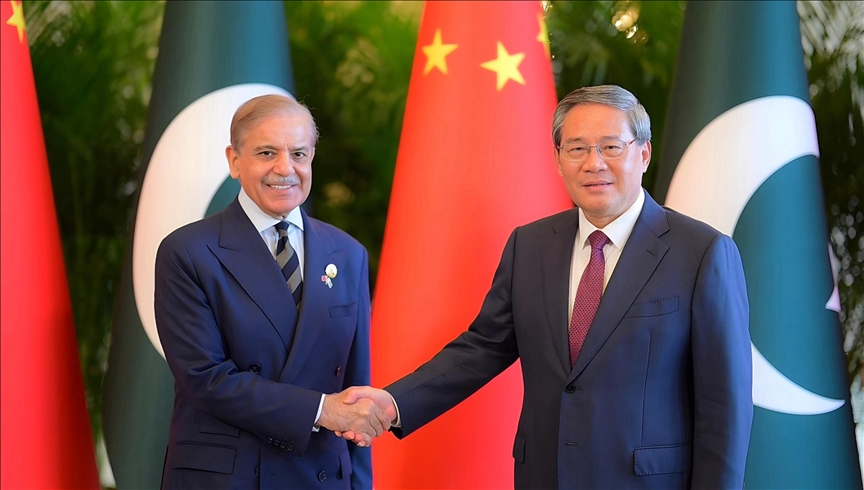Pakistan seeks early implementation of key projects under China-Pakistan Economic Corridor
Premier Sharif meets with Chinese counterpart in Beijing; Both countries agree to continue working on 2nd phase of CPEC with its 5 new corridors
 Credit: Prime Minister Pakistan Office
Beijing : Prime Minister Muhammad Shehbaz Sharif meets with Premier Li Qiang of the People's Republic of China (4 September, 2025).
Credit: Prime Minister Pakistan Office
Beijing : Prime Minister Muhammad Shehbaz Sharif meets with Premier Li Qiang of the People's Republic of China (4 September, 2025).
KARACHI, Pakistan
Pakistan's Prime Minister Shehbaz Sharif on Thursday called for early implementation of development projects under the multi-billion-dollar China-Pakistan Economic Corridor (CPEC).
Sharif raised the issue during a meeting with his Chinese counterpart Li Qiang in Beijing, a statement from his office said.
The Pakistani leader is currently visiting China, where he attended the Shanghai Cooperation Organization Summit and a military parade commemorating the 80th anniversary of the end of World War II. Deputy Prime Minister and Foreign Minister Ishaq Dar and army chief Gen. Asim Munir also accompanied him.
During the meeting, both sides also agreed to continue working closely on the second phase of the CPEC with its five new corridors.
Highlighting the significant contribution of the CPEC, a flagship project of President Xi’s Belt and Road Initiative (BRI), in Pakistan’s socio-economic development in the past decade, Sharif stressed the need for early implementation of the key rail, air, and road projects - ML-I, Karakoram Highway realignment, and operationalization of the Gwadar Port.
The $64 billion CPEC project is a key component of the Belt and Road Initiative. It connects China's northwestern Xinjiang province to Pakistan's Gwadar port in Balochistan via a network of roads, railways, and pipelines for cargo, oil, and gas transport.
China, Pakistan, and Afghanistan agreed in May to extend the CPEC into Afghanistan.
The project, however, is facing security challenges, particularly in southwestern Balochistan province, a key CPEC route, where suspected Baloch militants have been targeting Chinese workers for several years.
The two leaders also reaffirmed their shared resolve to further strengthen the "iron-clad, all-weather" strategic cooperative partnership between Pakistan and China.
Sharif also shared Pakistan’s intent to float Panda Bonds in the Chinese capital market soon.
He reiterated his country's support for President Xi Jinping’s landmark initiatives to strengthen multilateralism, including the Global Governance Initiative, Global Development Initiative, Global Security Initiative, and Global Civilization Initiative.
The two leaders also attended the signing ceremony of memorandums of understanding and agreements between the two countries with regard to cooperation in the development of CPEC 2.0, science and technology, IT, media, agriculture, etc.
On Tuesday, Sharif also met with Chinese President Xi Jinping, who hoped Pakistan would take effective measures to ensure the safety of Chinese personnel, projects, and institutions in Pakistan.
Since establishing diplomatic ties in 1950, Beijing and Islamabad have described their relationship as an “all-weather strategic cooperative partnership.” China has become Pakistan’s largest arms supplier, while bilateral trade volume surpassed $23 billion in 2024.
Anadolu Agency website contains only a portion of the news stories offered to subscribers in the AA News Broadcasting System (HAS), and in summarized form. Please contact us for subscription options.







